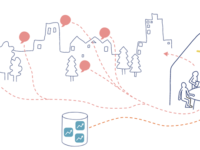Public services play a crucial role in shaping citizens’ experience of society. This handbook is aimed at professionals working in public services and focuses on concrete pratices to strengthen trust and democracy in everyday service encounters. It helps to make public services more effective by initiating and maintain trust, enhancing participation and agency, and through them delivering better learning, better safety, and better welfare.
Case Study Library
Where innovations are collected and shared to disseminate and replicate good ideas

Innovations:
0
This website, as well as any data and map included herein, are without prejudice to the status of or sovereignty over any territory, to the delimitation of international frontiers and boundaries and to the name of any territory, city or area.
Laakso Hospital trialled the state-of-the-art care robot Välkky, which utilises NASA space technology. The results were promising so the robot will get more trials and the technologies will be developed further. The hospital staff and patients were really interested in the robot and its versatile possibilities.
Case Study
Itla View – Crowdsourcing and AI-based digital tool for knowledge management and systems…

Itla View is a digital tool to help local services for families with children to manage their activities better using up-to-date data, to anticipate the need for corrective services and identify opportunities for preventive work. It enables different actors to form a shared holistic picture of the well-being of children, young people and families in their area. Itla View collects observations sent by field actors on the daily lives of children and families. It utilizes artificial intelligence to…
Tampere Pulse is a revolutionary service that utilizes a predictive analytics algorithm to predict visitor flows in the city center of Tampere, Finland. It helps businesses make informed decision that will help them thrive, be it responding to growing demand, developing new business ideas, or adjusting required workforce and opening hours. Tampere Pulse is available to everyone through an intuitive and easy-to-use interface, on both mobile and desktop devices.
Individuals often experience managing tasks related to individual finances and debt as burdensome and shameful. As a response, Financial advice clinics in Finland provide anonymous, low-threshold guidance and advice for citizens with small and large financial questions without booking an appointment. Citizens have the possibility to meet professionals from different fields simultaneously, and receive help for their financial issues at the same location.
The Sola calculation tool allows estimate the economic impact of 25 distinct social phenomena at municipal, regional and national level. Impact assessments at one, five and ten year intervals can lead decision-makers to better understand how to invest in wellbeing and accelerate impact investing. Results of the tool have been used in several municipalities as part of health and wellbeing promotion. A MOOC course has been developed and similar calculation tools are recently being used in other…
Case Study
Osaamistarvekompassi: Tackling Skills Mismatch through AI-assisted Skills Needs Anticipation

The Service Centre for Continuous Learning and Employment (SECLE) was established to anticipate the skills needed in working life and to fund competence services to proactively improve the matching of skills and jobs. SECLE’s new online service, Osaamistarvekompassi (Skills Needs Compass), provides anticipatory data on job transitions, along with insights on near-future skills needs derived from AI-assisted data mining, in a user-oriented way. The service guides the allocation of SECLE’s…
Case Study
A network-based Competence Centre for Sustainable and Innovative public procurement in Finland
The Finish Government established a network-based Competence Centre for Sustainable and Innovative Public Procurement (KEINO) in 2018. The Centre provides, free of charge, advisory services to public procurers, promotes the strategic importance of procurement competencies in public management, facilitates creation of buyers’ groups among procurers, and disseminates information and good practices. The network consists of five public organisations.
Finland’s Ministry of Finance set a target for all public services to be available digitally by 2023 as part of its Program for Promotion of Digitalisation. The 'Co-designing future digital services' project is a new way of providing free expert mentoring for public sector organisations in developing their digital services, with an emphasis on collaborative learning. The aim of the project is to ensure that future digital services are designed to be human-centered and of high quality.
The innovation addresses bullying in schools. How to report it and how to follow it. The innovation is a tool on how to report bullying quickly and react to it effectively. Also on how to follow up and analyze data regarding bullying. The innovation lies in the use of existing tools within Google Workspace for Education and on how to use digital tools to identify and react to bullying. Many schools use Google Workspace for Education, so the innovation does not require any further investment.

